From today until Sunday it's Crimefest, the UK's premier crime book festival. Crimefest takes place every year in Bristol, but for one reason or another I haven't been since before covid, so I'm greatly looking forward to it. However, the railway unions chose Wednesday for a strike forcing us to travel by coach. The coach arrived "unroadworthy" and we were delayed nearly four hours as we waited for a replacement. But here we are.I had planned a post about Henry Moore's home and estate that we visited on Sunday, but that will have to wait for another occasion. No doubt Caro and Jeff will report on Crimefest itself as the week progresses, but we've yet to have our first event. So I was blogless until Stanley volunteered one of his old blogs, so the Crimefest Retrospective is of blogs rather than Crimefests. Here's Stan on Serious Research.
The writers I know take their research seriously. Just take a look at the writers on this blog. Annamaria goes to South America and East Africa to ensure she gets her facts right. Jeff heads to Greece, Sujata to Japan or India. Susan went and lived in Japan - that's taking research really seriously! Craig pops up at conferences all over the world, and Kwei is often seen being driven all over West Africa. Caro traipses through the rain all over Scotland. Ovidia takes her research on Singapore so seriously that she insisted on being born there. As for Zoë, we never know where she is.
Michael and I also take our research seriously, which is not surprising since we both had careers as professors. For us, it is important to dig into all aspects of the story we are going to tell: the backstory, the front story, the characters, and the location. Actually, I should have written that list differently. Location should have come first and not last, because it was while we were on location on the Savuti plains of the Great Chobe Game Reserve in Botswana that we had the idea to write a mystery set in Botswana in the first place.
I'm sure you're bored of hearing how that came about, but I'll repeat it anyway. One day, we watched a pack of hyenas hunt and kill a wildebeest (click here to learn about the wildebeest by its other name). Even though they are known as scavengers, hyenas when hungry, are very successful hunters. After a few hours, three or four if I remember correctly, the wildebeest had disappeared, because hyenas eat both the flesh and the bones.
.jpg) |
| Cleaning up after dinner |
'Aha!' we exclaimed. 'If we ever need to get rid of a body.... No body, no crime.'
And that was how it all started. Fifteen years later, with typical academic alacrity, we started to write A Carrion Death, which needless to say opens with an academic and a game ranger stumbling across a hyena that was savouring a human body.
So location, or place as some call it, plays a big role in all of our books. And we've been delighted by the number of times reviewers have commented on the fact that place is itself a character in our stories.
We have visited all the places we've written about in Botswana, as well as other places in neighbouring countries - just to get the feel of the places. And the feel is often the most important, not necessarily the look or topography.
So I would like to share some glimpses into the extent to which and the seriousness with which Michael and I take our research into place.
Most of our adventures have started in a small plane in Johannesburg, which I then flew to Botswana or Zimbabwe. There have been some adventures related to the flying that I'll relate some other time - contaminated fuel lines, maps being sucked out of the plane over the Kalahari through a door that popped open, and so on. Nothing too serious. (I recall a head on collision with another plane. But at least it was on the ground at the time...M)
I have a very basic philosophy of being a pilot, namely that I want parity - that is, the number of landings should equal the number of take-offs. I'm pleased to report that I have always achieved that goal.
As you can imagine, flying in Botswana is very different from flying in South Africa. For example, facilities are less sophisticated. Most airports, actually air strips, we landed at were dirt strips cut out of the bush. That often posed problems not normally experienced in, say, the United States. I would always fly low over the strip to shoo away any elephants or other animals that may have wandered on to it. And when we landed and were ready to head off on our adventure, we would cover the tyres and tail of the plane with thorn bush branches to keep the hyenas from chewing on them.
 |
| Protecting the plane from hyenas |
Our usual method of operating once we reached our destination was to be met either by friends who lived in Botswana or by an outfitter we'd hired.
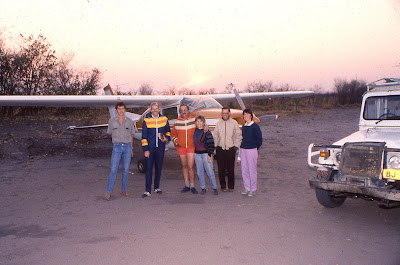 |
| Airport pick-up |
 |
| Bush beer break |
These photos were taken in the area where we saw the hyenas devour the wildebeest. Several of our books and short stories have taken place in similar places.
 |
| Haze over the Savuti plain |
 |
| Walking |
 |
| Dead elephant - disgusting smell |
 |
| Desert oasis |
 |
| Others found the oasis |
 |
| King of the plains |
 |
| ...but who does all the work? |
Our latest book, A Deadly Covenant, is set on the banks of the Kavango River in northwest Botswana, just before the river fans out into the Okavango Delta. It's the only place I've been where I suffered bird overload: too many species to really take in, in such numbers that it was difficult to believe. Here are some photos from that area.
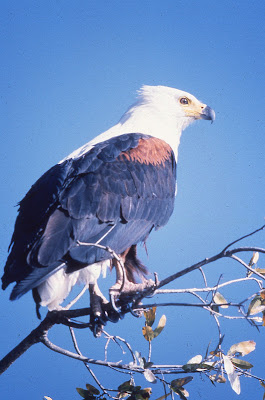 |
| African fish eagle on the lookout for food |
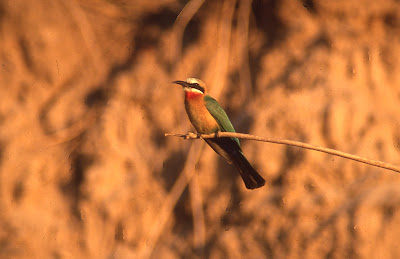 |
| White-fronted bee eater |
 |
| Egrets |
 |
Fish eagles in tree
|
 |
| Lilac-breasted roller |
 |
| Marabou stork |
 |
| Waiting for dinner |
 |
| Saddlebill stork. I call it the 3M stork because of the Post-it note on the beak. |
 |
| White-faced owl |
 |
Perhaps a scops owl. Michael?
I think so - M |
A couple of times we strayed from Botswana, usually on purpose, but once accidentally, and ended up in Zimbabwe. We had a couple of research trips canoeing down the Zambezi, always on the lookout for hippos and crocs. The strategy for hippos was to bang the side of the canoe. The hippos would surface to see what was going on. Once we saw where they were, we were very careful not to get between them and deeper water. They can be VERY dangerous. Here are some pictures of those research trips.
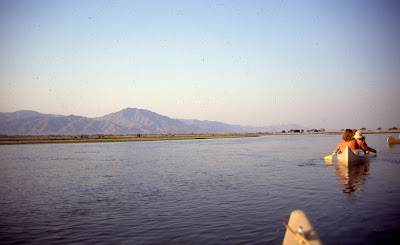 |
| Wandering down the Zambezi towards Mozambique |
 |
| Getting together for a chat. Or couldn't they steer? |
 |
| The men worked while the lady read a book. |
It turned out that we had more trouble with the elephants in and around the Zambezi than we did with the hippos and crocs. We saw this one ahead of us.
 |
| No problem at this point. |
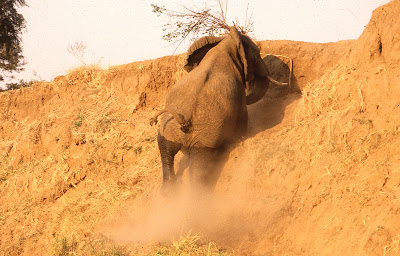 |
| But it had difficulty climbing the bank. Then it charged along the bank, trumpeting, angry |
I think it had as big a fright as we did. Fortunately we paddled away and were safe.
On another occasion, we had stopped on an island, probably a couple of hundred metres long and a hundred metres wide. We were just setting up our lunch table, when a young male elephant appeared from under a tree. It was curious. It wandered over towards us, took a good look, then wandered off around another tree. It appeared from behind that tree, stared again, then went back. Again it re-appeared, took a long look at us and, without warning, trumpeted and charged. The only option for us seemed to be to run and jump off the high bank into the Zambezi. As we turned, our game guide, jumped out in front of the charging elephant, shouted and waved his hands. The elephant skidded to a halt, literally, because we saw the skid marks afterwards.
The elephant looked quizzically at the game ranger, turned, and sauntered off.
When we asked the ranger how he knew the elephant was going to stop, he replied that he didn't. However, he continued, young male elephants like to strut their stuff and usually back off when confronted like that. The word 'usually' has stuck in my mind to this day.
We began our Zambezi trips at Mana Pools in northern Zimbabwe. There was a small rustic camp there which was a fine place to prepare for the trip. As you can see below, we weren't the only guests in camp.
 |
| Are you in line for the loo? |
One day we were delayed in leaving the camp because a temporary denture I had put next to my bed was no longer there when I woke up. We searched and searched but found nothing. I was certain that it was next to my bed when I went to sleep, so I began to suspect my travelling companions of playing a prank on me. It turned out they weren't and we eventually found the denture on top of a cupboard in the room I was staying. A mouse of some sort had been attracted to it during the night and dragged it to the top of the cupboard to inspect it in private. When it realised it wouldn't fit, it abandoned it and wandered off.
 |
| To prove this wasn't all fun, here's Michael doing his research. |
This was the way to get clean - and cool. We always had to have a lookout for crocs.
I hope this blog clears up any misunderstandings readers may have had about research. It is difficult, time-consuming, and often dangerous. However, someone has to do it.
.jpg)












































No comments:
Post a Comment